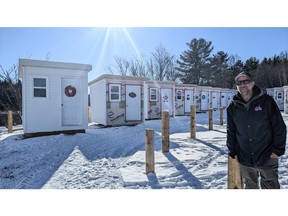Humanity Project builds bunkhouses for Moncton's homeless
The project received $310,000 from the City of Moncton and $1.2 million from the province for ongoing support to help people get off the streets

Article content
LITTLE RIVER • A project to build 21 “bunkhouses” designed to provide emergency winter shelter for homeless people from the streets of Moncton is nearly complete, the director of the Humanity Project said Friday.
The 21 “bunkhouses” were constructed in two groups next to the main house of the Humanity Project’s farm in Little River, approximately 30 kilometres from Moncton on the south side of the Petitcodiac River. Each of the little houses is eight feet by 10 feet (except one which is eight by eight) and constructed with new materials. They each have their own door, window, bed, fridge, shelving unit, desk, and mini-split heat pump system. Residents will also get a hand-made quilt that they get to take with them when their stay is over. They don’t have their own washroom, since they are just a short walk from the main building of the farm, which has bathrooms and laundry facilities.

Charlie Burrell, director of the Humanity Project, said Friday his crew of volunteers and various contractors have been going flat out since September to get the little houses ready for the first occupants. Moncton city council voted to supply the Humanity Project with $310,000 to build the little houses, while the province is providing more than $1.2 million for support services to help get people off the streets and into housing so they can begin the process of turning their lives around. A tour of the site Friday showed that the houses are nearly complete and are waiting for the final electrical connections and installation of a new septic system.
“This was an emergency solution to get people off the streets this winter,” Burrell said of the bunkhouses. “It’s going to take more time to renovate our big building.”
Burrell said there is a waiting list of people who want a place to live, and the little houses are just a step toward a larger project to renovate the farm so it can accommodate more people. The unfinished main building has room for apartments, a commercial kitchen, offices and support services. For the first phase, Burrell said they will have professional nurses and counsellors at the farm 24/7 to assist people living here. Some people already living at the farm also work here and help care for the pigs, goats, cows and other animals.
The Humanity Project’s main headquarters is on St. George Street, where they provide free meals to hundreds of people each day That building is also being renovated with new stairs so they can provide better services to the homeless and others who need help.
“For every person I’ve met who was homeless, the reasons for them being homeless are as unique as the individuals themselves,” Burrell said. People who have fallen into drug addiction and homelessness, depending on someone else to feed them, often lose the basic skills of caring and cooking for themselves.
“Getting people off drugs is the first step, but we need to set them up for success, so when they leave here and have a new apartment, they already have good habits. It’s about giving people another opportunity, to get clean and move forward in life,” Burrell said. “People who have been on the streets for a long time and suffering from homelessness, they are living in survival mode. We’re trying to change that and give them the skills and knowledge and the confidence in themselves to move forward.”
Burrell said getting people off the streets and out to the farm removes them from the distractions and temptations.
“You know what the hardest part of coming to the farm is? Leaving,” he said. “It’s quiet here with the animals and go back in town with the hustle and bustle and sirens all the time. It’s a different setting to get in touch with your thoughts.”
He said homelessness often begins after a job loss, illness or trauma.
“We all have a breaking point. One day leads to the next and the next thing you know, you’ve been on the streets for 10 years and wondering where did the time go?”
The Humanity Project provides meals to many who aren’t homeless but are living extremely tight financially, so he believes the situation is destined to get worse with rising inflation.
“There isn’t enough support to meet the demand of people needing help,” he said, urging everyone to help others. “The smallest things that people do can make a big difference to someone else.”













Postmedia is committed to maintaining a lively but civil forum for discussion. Please keep comments relevant and respectful. Comments may take up to an hour to appear on the site. You will receive an email if there is a reply to your comment, an update to a thread you follow or if a user you follow comments. Visit our Community Guidelines for more information.